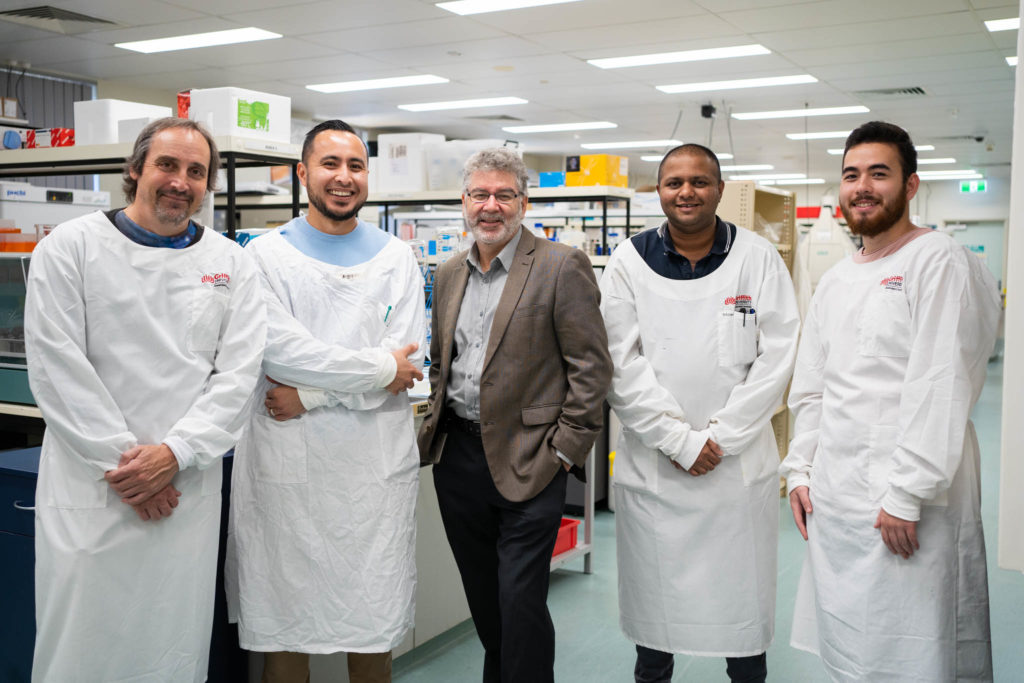
Griffith University’s Professor Nigel McMillan, of Menzies Health Institute Queensland, is naturally excited about the experimental gene silencing anti-viral treatment he and his collaborators have developed, that has proven 99.9% effective against COVID-19 in animal studies.
As he looks to begin a Phase 1 human clinical trial by the end of the year, the passionate gene therapy advocate believes the pandemic’s silver lining is the opportunity to accelerate a whole new family of precision RNA medicines, pushing development forward by up to 20 years.
Before the pandemic, few people outside health science circles would have heard of RNA medicines. Now the mRNA (Messenger RNA) vaccines produced by Pfizer-BioNTech and Moderna are household names and mRNA technology is viewed as the brave new world of vaccine development.
BioNTech had actually been working on its mRNA vaccine for well over a decade, so it wasn’t quite the classic ‘necessity is the mother of invention’ story, but COVID-19 quickly catalysed development that might otherwise have taken years.
“In a time of crisis and need, we find a way, and these vaccines are a tremendous example of that,” says Professor McMillan, who has been researching both infectious causes of cancer and gene therapies for more than two decades, the last ten at Griffith University on the Gold Coast.
This will grow a whole new family of medicines that are precise and personalised.”
The way forward is even more exciting thanks to large-scale interest and investment and the potential for using RNA in many ways – from coding a message to produce the SARS-CoV-2 virus spike protein (in the case of the vaccines) or any other virus protein for other vaccines; to ‘silencing’ the replication of virus cells in the lungs, in the case of his team’s therapeutic research.
Developed with Professor Kevin Morris and collaborators at the City of Hope cancer research and treatment centre in the US, the team have used siRNA (small interfering RNA) deployed directly into the virus genome via a ‘stealth’ nanoparticle.
“Our next-generation anti-viral works by stopping the virus from replicating in lung cells, the critical site of infection, and is delivered in lipid nanoparticles designed at Griffith University and City of Hope,” Professor McMillan says.
“It is designed to work on all betacoronaviruses such as the original SARS virus (SARS-CoV-1) as well as SARS-CoV-2 and any new variants.
Effectively we combined two technologies– the siRNA anti-viral with a highly-targeted nanoparticle delivery mechanism which is scalable and relatively cost-effective to produce in bulk and stable at 4°C for 12 months.
This work was funded as an urgent call by Medical Research Futures Fund and is the type of RNA medicine that can be manufactured locally in Australia.”
As they plan to pursue a clinical trial and hopefully commercialisation, Professor McMillan is a virologist in a ‘candy shop’ considering the potential opportunities for RNA technologies – from mRNA applications to make proteins for growth hormones and clotting factors to the BIG opportunity in personalised cancer treatment.
We can use precise RNA technologies like a volume switch to turn faulty genes down and even off.”
“We can sequence cancer tumours and find the genetic error behind a person’s individual cancer expression and silence that expression or edit it using CRISPR technology to add some extra DNA that causes the gene to be misread – like adding extra letters to a word so it no longer makes sense, and stopping the replication process.
Again ‘stealth’ nanoparticles deliver highly-targeted therapy, unlike more generic treatments such as chemotherapy.”
Indeed, Professor McMillan led world-first cancer research in 2019 that successfully used CRISPR for the first time to cure cervical cancer in mice.
With the Federal Government’s focus firmly on creating sovereign supply chains, particularly for medical products, the opportunity to be part of an emerging RNA technologies eco-system in Australia that extends from lab to large-scale manufacture is equally exciting.
“There will likely be a number of opportunities in different states to contribute to aspects of the supply chain, from pre-clinical R&D to manufacture of different types of RNA (eg mRNA, siRNA) and for different uses, mostly medical but also agricultural, which is a segment of the market Queensland might naturally be aligned to,” Professor McMillan says.
We could see a real RNA revolution over the coming decade if we can maintain interest and investment.”